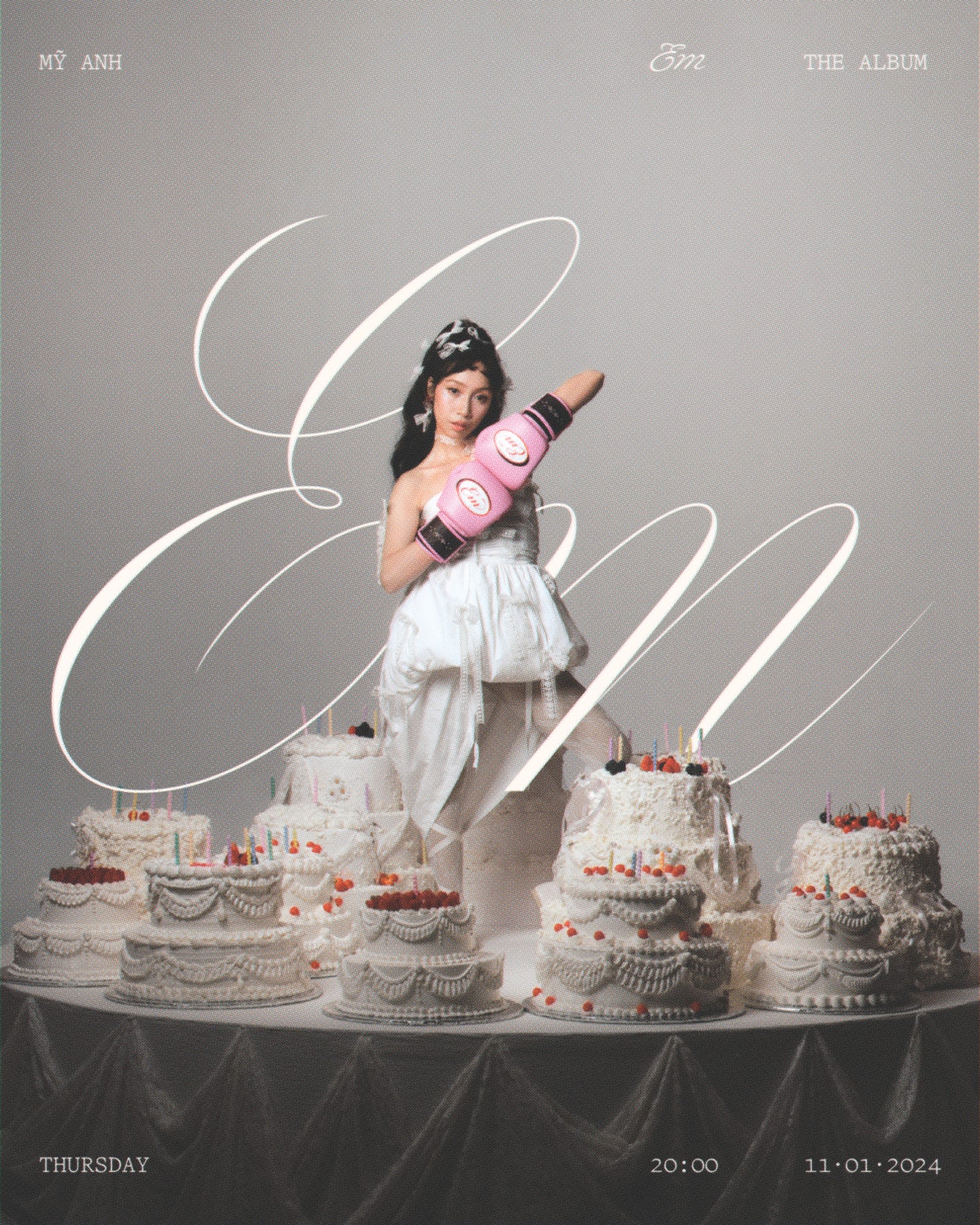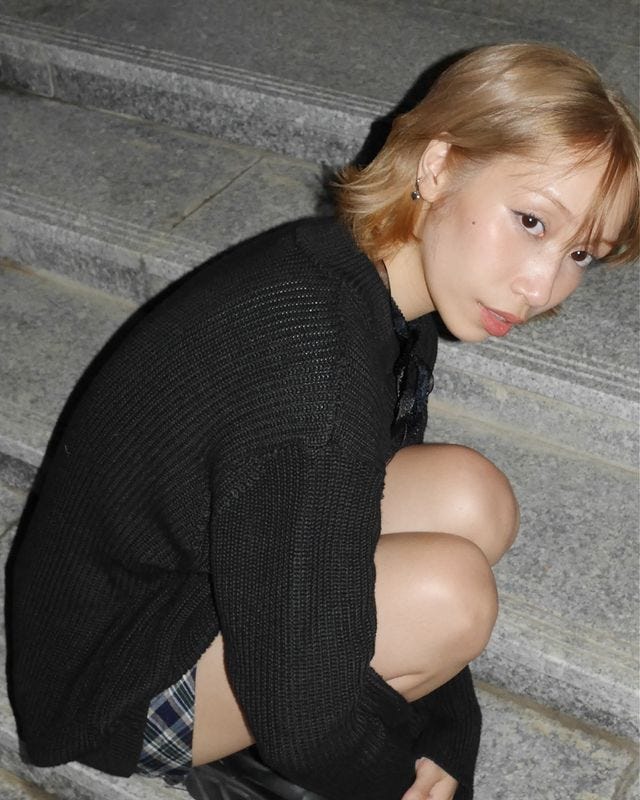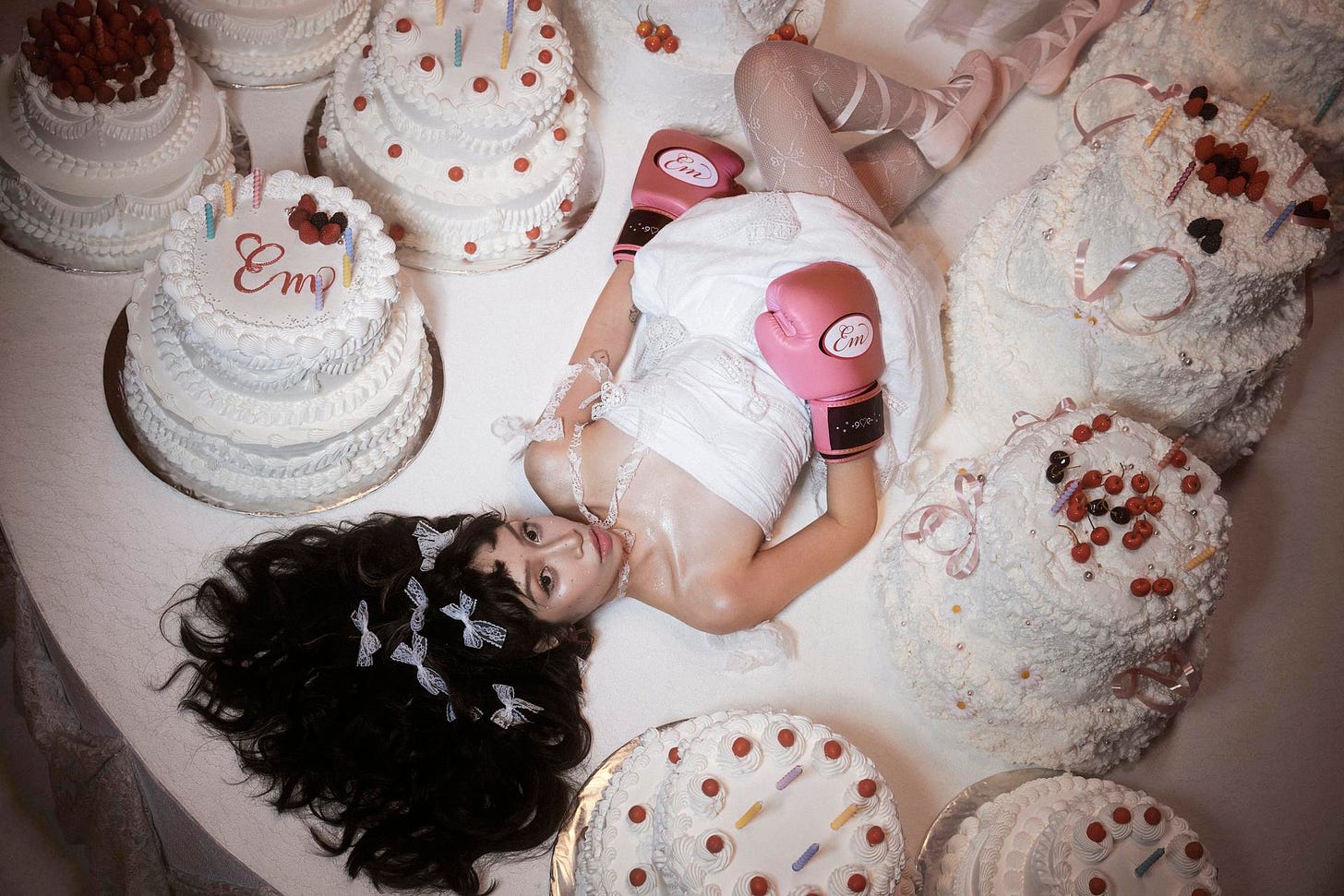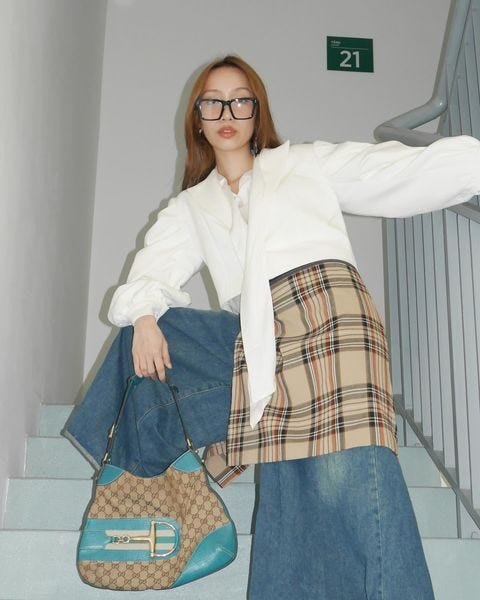My Anh has come full circle.
Vietnam's fresh-faced songstress is growing up.
📍Hanoi, Vietnam
My Anh is a singer-songwriter and producer whose ability to blend musical genres has made her one of Vietnam’s leading Gen Z stars. Her highly anticipated debut album will be released on all streaming services this January 11th.
T: I want to begin by saying how refreshing your music is and that I admire your transparency throughout your music production process. How’s life?
M.A.: It’s good! I was up until 5AM yesterday talking to my best friend, Kieu Anh, about the meaning of life. I don’t know how we got there and I’m definitely in need of sleep, but I’m very excited for this interview. Everything’s been really exciting because I’ve been preparing for my upcoming album ‘Em’.
T: Yes! In previous interviews, you’ve talked about how the making of a song is deeply personal to you and your emotions. How does the process usually begin for you?
M.A.: Every song is different, just like how every emotion and experience is different. I try to stay as raw and authentic as I can be. If I’m starting with an experience I’m going through, I’ll start drawing a mind map with keywords of how it’s making me feel and the visuals I get from those emotions. Then I’ll go from there and hum a melody or start building a beat. The starting point is often hardest for me to nail down what exactly it is I want to write the song about and how I want it to sound. Once I’ve got it though, the process flows more naturally.
T: You’ve emphasised authenticity as something artistically important to you. What has it been like to share such personal emotions out into the public sphere and receive opinions about it?
M.A.: I’m fortunate that my parents also work in the industry, so as a child I always knew how things functioned with the press and media. But knowing is one thing and actually being in the scene is entirely different. Artists nowadays don’t simply release music and perform, there’s a lot of social media and branding involved. I think it took me a long time to get to a point where I felt the need to actively use social media.
T: How do you ground yourself throughout all that noise?
M.A.: Since my debut, I’ve received this wave of opinions. They’re not all bad, some people genuinely want to give you advice. But I think no matter how much you try to mentally prepare yourself, you’ll want to eventually take a step back, which was what I did for a month with my social media. In any industry, really, there are going to be conflicting interests between you and your audience that sometimes don't align. There’s always pressure to make music that might be more commercially successful, which is definitely advice I’ve received. But how I deal with it is by taking a step back from everything, which I didn’t know how to do before. I do a lot of mind maps, which is my go-to de-stress method.
T: I’m glad to hear that. I notice that you collaborate almost exclusively with people who are close to you, notably your brother-in-law & producer Eric Derwallis. Many artists have similar tight-knit collaborators they always work with, such as Billie Eilish and Finneas O’Connell or Jack Antonoff and Lorde. How does collaborating with close friends and family influence your sound?
M.A.: Music has always been part of the foundation of our relationship, which is so important when it comes to creating collaborative art. You have to be emotionally comfortable in yourself with someone to bring out the best ideas together. I’m pretty hesitant about collaborations because I’m a really shy person. Even with Eric at the start, it was so hard for me to express my opinions and give him feedback on the production changes I wanted to make. I’ve been working with my dad too, and it’s been really nice. But I would love to branch out and start collaborating with others once I’ve become surer of my identity, which is the phase I’m in now.
T: You’ve received a lot of praise as one of Vietnam’s leading crossover artists who has a wide Gen Z appeal, with your music spanning across V-pop, R&B, soul blues, and bossa nova. How do you always seem to strike the right balance?
M.A.: I used to feel insecure because I thought that I needed to choose a specific sound or specific branding for my music. But I realised that there's such a beauty about the ability to ‘commit’ and knowing that everything that we make right now is simply a time capsule. And we don't have to sing or play this forever if we don't want to. And I think it's very exciting knowing we have so much freedom as artists and it truly reflects our personal growth and changes. For me, at least right now, I’ve moved past the pressure to maintain cohesion, because I myself am always growing and changing every day. So why should I force my music to stay static like that? Since I began to think this way, I’ve felt a lot freer with experimenting and committing to what I like at that moment and being okay with the fact that that’ll change. It is such a privilege to be able to grow alongside my audience as well.
T: You performed at 88Rising’s Head In The Clouds 2021 festival, which was huge because you were one of the first Vietnamese artists to do so. What was that like?
M.A.: I also ate pizza with Rich Brian - I used to watch his music videos in the seventh grade! Every time I get asked this question, the answer is still the same; it feels pretty surreal. I’m so fortunate to have had that experience, and I got to perform with my brother-in-law with my sister in the audience. Usually, I get terrible stage fright, but for some reason, I didn’t feel scared at all because the audience sent out such a comfortable energy. There were a lot of Vietnamese people there too, and they held up a My Anh sign, which I didn’t expect at all. In a way, although I was technically away from home, it felt like I was actually at home.
T: So, you are gearing up to release your highly anticipated debut album. How are you feeling?
M.A.: I'm nervous and excited! Our team has been working very hard for this project and it feels quite surreal that it's finally coming out. Thank you to everyone who's been patiently waiting for me. I feel like this album really comes from the heart and I hope you’ll feel my growth and find comfort in feeling confused, which is what the album mainly explores. There are also elements of full-circle moments I’ve had. The opening track of the album opens with an interview I did when I was 5, where I’m asked if I like singing and I go, “Yeah!”, which is where I started. I feel like I’ve been able to return to that core passion and simplified my love for music and accept the fact that I’ll keep at this. We will keep losing ourselves over and over again, but at some point we’ll return back to that state. Once I started accepting that that was the nature of time and life, I felt good.
T: It’s good to see you take breaks. I respect that you’ve taken time to hone your craft and focus on producing a full body of work despite the industry norm to continuously drop singles. How do you do this successfully?
M.A.: I stay close to my family. Most of the industry activities take place in Saigon, which is a great place where artists can grow and there’s lots of opportunities. But I decided that I wanted to stay in Hanoi to reset myself. I think it’s hard to move past this fear of missing out, at least in this field, because all our achievements are very public. I’m pretty sure this is a collective feeling, and we’re all trying to survive by making a living from our craft. I’m very fortunate to be a freelancer, so I have more control, whereas other artists who are signed to a label face different expectations that I can’t comment on. For me, I remind myself that I do have a plan and know what I’m doing. I just hold onto that feeling and through therapy have been referring to my inner child as ‘My Em’ (Little My Anh). The album title is ‘Em’, which directly means ‘me’, but also refers to my inner child. So I’ve been practising separating myself and my inner child, and viewing her as a little sister that I should take care of.
T: I think that’s a great way to recondition how you talk to and view yourself.
M.A.: Right. It’s hard to see ourselves as a being. For a while, I couldn’t separate my professional and personal life because I myself am the product, so it can be difficult to see myself as a person and simultaneously a product that requires branding. But I feel good now because I think I’m learning the skills to navigate that and finding joy in little things.
T: On the topic of mental health, where did you find the strength and creativity to continue working on such a large and quite anticipated body of work?
M.A.: Oh, I didn’t. When I took a pause from social media, I also stopped doing music entirely. It was such a hard decision for me because the industry requires you to stay super active all the time. In the beginning, I felt a lot of guilt, thinking about all the what-ifs that are attached to pausing any career. Music is my whole heart, but I’m more than my career and there’s an inner child waiting to be listened to. I was working on other hobbies during that time, like crocheting and cooking. I used to think that doing anything that didn’t benefit my career would be a waste of my time, but through that period I realised how important it was to have interests outside of music, for the sake of balance.
T: So what will the visuals of this album be like? What were you inspired by?
M.A.: It’s based on one of the most important realisations I’ve had in the past year, which was largely influenced by Buddhist master Thich Nhat Hanh. I’ve also incorporated a lot of circular imagery. Circles can represent time, birth and death, my relationship with music, and my full circle realisation that I’m in the position my mom used to be in because I’m also pursuing the career she has now. Understanding that time doesn’t wait for you, and that’s the nature of life, so living simply and enjoying things in the moment is okay. A lot of it is trying to ground myself whilst reflecting on my past experiences with toxic and healthy relationships. It’s a way to capture this period of my life before moving on to capture the period of my life further into my 20s.
T: Will your album be a mix of English and Vietnamese songs?
M.A.: Yes! Totally. But I'd say ‘Em’ is the Vietnamese part of my identity. After "Em", I'll let y'all know the other bit.
T: You also work with stylists for most of your photoshoots, events, and shows. What has this collaboration been like?
M.A.: It took a lot of experimenting. We also have a mutual understanding of what my personal style looks like, which was thanks to the pause I took earlier this year. It helped me clearly figure out what I liked without other people’s input, which was also because I was on Pinterest every day. Once I was able to do that, it was like I got tunnel vision when I returned to work, which helped me voice my opinion a lot easier when I didn’t like a certain aspect of an outfit, something they really needed to hear from me.
T: Speaking of that, I love that your style is so whimsical and colourful - but never over the top. In your opinion, how do fashion and music intersect?
M.A.: They’re both forms of art, and I guess the best way to put it is that art reflects life and who you are in that moment. Our state of mind in a given moment will show through the way we dress and what music we are listening to. It really depends on your mood and where you’re at, what the context is. Both aspects are a part of our identity. Even the music I make – when another person in a different state of mind listens to it, they may draw their own meaning from it.
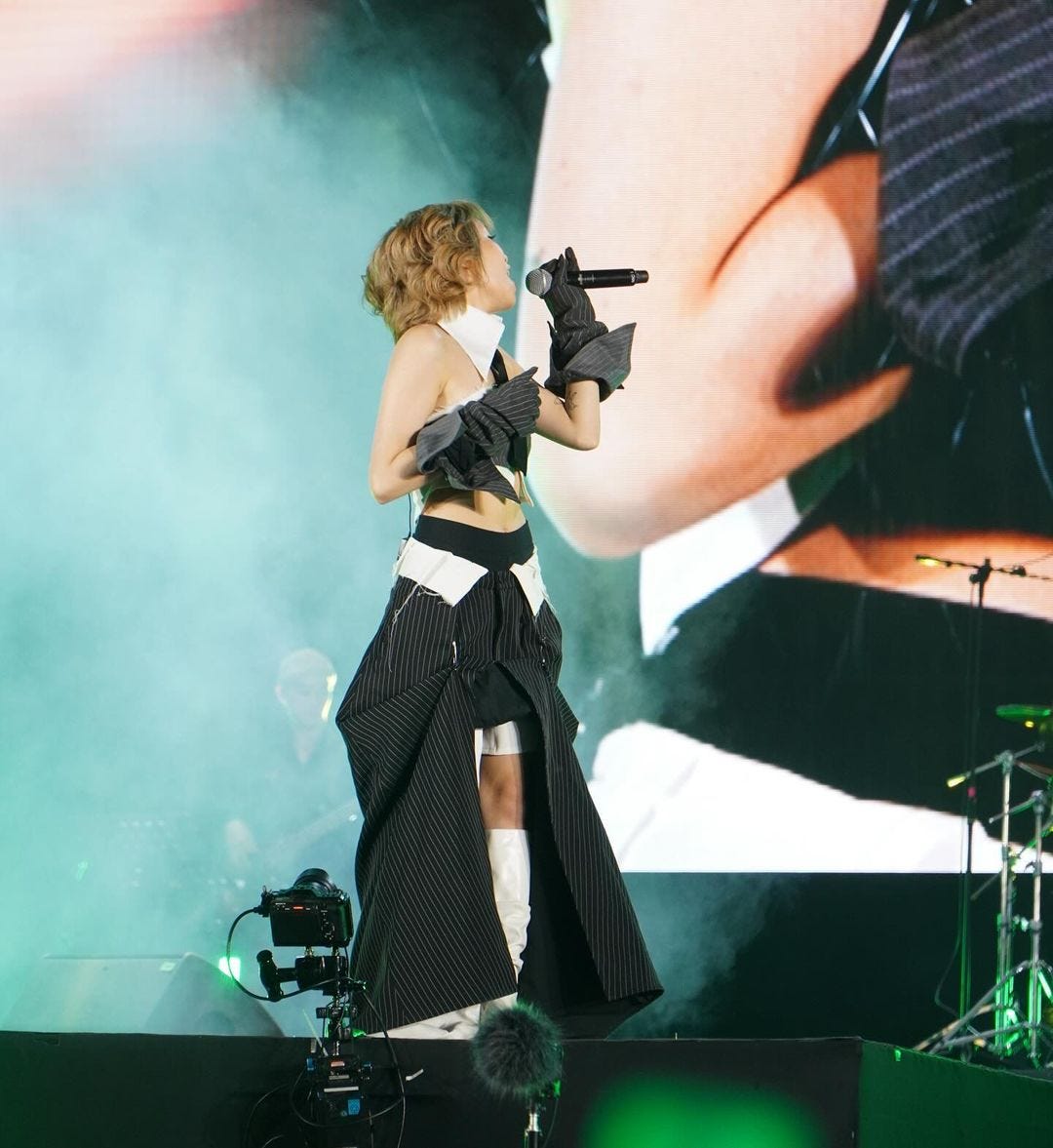
T: How does fashion function as a vehicle for your personal expression but also as a way to present your music on stage?
M.A.: I guess when I took the time to figure out what I like, the style I developed ended up reflecting my personal life. Now, I really like dressing up, which I really didn’t care for before. That’s fine too, but now I like to look cute when I go up as a way to show up for myself and feel good about it. Now, music is very attached to its visual representation and literally everything people see alongside it will be viewed as part of your identity, alongside the energy you put out. All this contributes to my onstage character. So I’m happy I found a style I feel comfortable and good in.
T: How do your onstage looks differ from your everyday style?
M.A.: I don’t know if it has, ‘cause I’m a lot more casual in real life. On stage, you need to match the set and stand out a lot more, whereas day-to-day I don’t really wear makeup unless I’m going out with friends. My Pinterest era mainly taught me that I can do makeup looks to go out with friends, not just for stage makeup inspiration. It was great because I realised I could just do it for myself, which wasn’t something I felt before. I used to view it as a chore, rather than something that makes you feel good. Now, I search for hairdos and DIY beauty things I can do myself. I’m trying to allow myself to have a little fun, even when it’s not work-related, because I think it’s really important.
T: Similarly, hair, makeup, and nails are a large part of your onstage persona. What’s the process of curating these looks as part of your final outfit?
M.A.: Honestly, my stylist helps a lot with the process and sends me a lot of inspiration. It took a lot of trial and error and not feeling entirely myself, but there isn’t really a choice when you have a show to run to. Everything is a process to figure out what’s best for you, but lately, I’ve been really enjoying leaving my hair naturally straight – partly because I’m lazy to wash off hair styling products, but also because I feel good with my natural hair.
T: Lastly, can you give us something to look forward to from ‘Em’? Maybe a favourite lyric or production detail?
M.A.: I want to maintain suspense, so I’ll just say that there’s a lot of ‘My Em’ on the album. Lots of nostalgia and childhood sounds. I hope that people will be able to identify with my personal evolution of exploring different parts and layers of my identity and being accepting of that, as well as finding themselves in the artwork.
T: Well, thank you for having me, we’ve had a really lovely conversation. I’m excited to hear your album!
M.A.: This was really nice, thank you.
This article is an extended version of the original interview published on UCL’s Pi Media website. This interview was conducted in July 2023.
FYI
Follow My Anh on Instagram
Subscribe to My Anh on Youtube
Listen to My Anh on Spotify:
Thank you for reading internet people. This post is public so feel free to subscribe, share and leave a comment.


